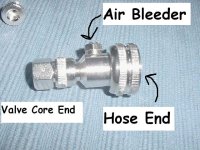deanhedges said:
My dealer says they fill with beet juice.
Would that same dealer coincidentally SELL beet juice? (Rim Guard)
It ain't cheap. It IS a good alternative, as it doesn't promote rusty rims or create a hazmat situation with a simple tire puncture.
I log a LOT of hours in a typical "tractor year". With those hours comes more likelyhood of flats. With the cost of a tire repair service, it becomes cheaper in the long run to get your own equipment to handle the job. It isn't brain surgery. I've done dozens of my own tires. (3 last week alone....) Total cost involved in getting set up to do them (with long lasting equipment) is typically around $100 to $150, pump, hoses, bleeder valve, and a barrel. Fluid can even be gravity fed. (pump is MUCH faster) Same equipment can be used to remove fluid in the event of a flat. In that situation, you want the speed of a pump. (to save as much fluid as possible/prevent as much of the "spill" as possible)
Any of the multiple choices of "fill" has it's advantages and disadvantages.
Ca/cl is corrosive and will kill grass if spilled. You can get more pounds per gallon with CA/CL than any other option.
Windshield washer fluid is a tad more expensive and not completely without environmental risk.
Beet juice can be EXPENSIVE.
Pure water is risky at best regarding freezing.
I'd highly recommend using tubes. Tubeless tires can be filled, and with precautions, isn't a death knell to your rims (corrosion) but tubes offer more protection.
My personal choice? I use ca/cl. I've seen my share of rotted out rims, but with my own tractors, I've made certain the rims are maintained and protected as much as humanly possible. I've got one tractor that's been with me since 1971, calcium chloride in the rear tires every since, and rims that look ALMOST new. The trick is to clean them up REAL good when you do get a puncture.
Final alternative? Cast iron weights. They're non-corrosive for sure, but not nearly as cheap. Fluid is carried lower, having less of a negative effect on center of gravity of the tractor. (fluid may even provides MORE stability)
